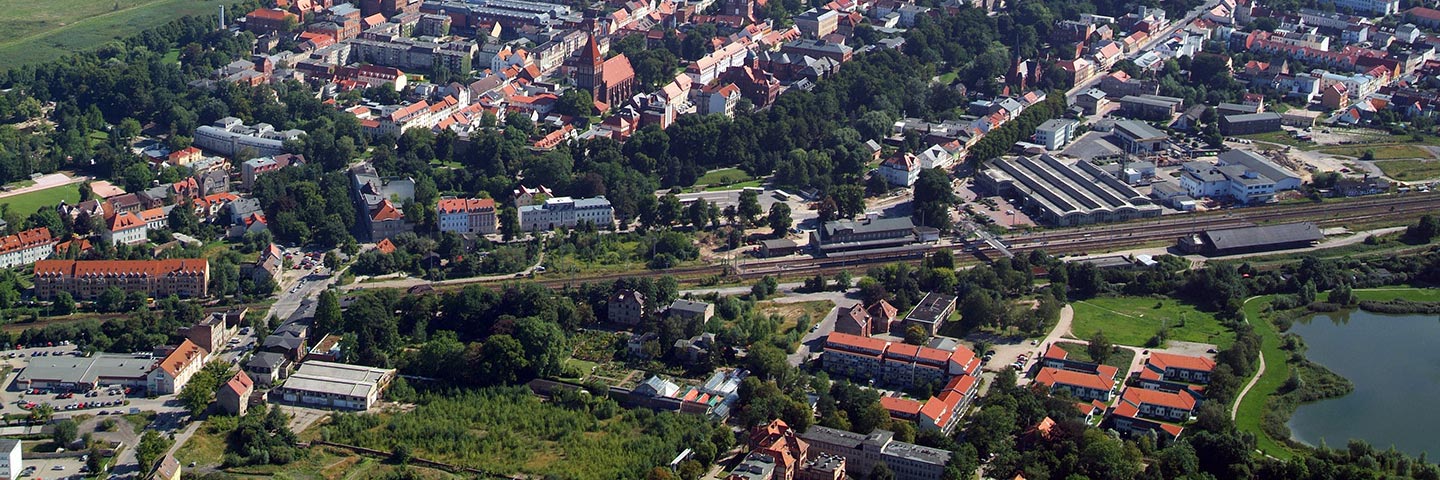News/All pieces
Specifically: 5 measures for CAP
Proposals for peatland and climate protection
06/12/2019 In Germany, organic soils account for only 7% of the area used for agriculture, but cause 37% of the emissions from agriculture. The EU average is similar. However, the current Common Agricultural Policy (CAP) of the European Union (EU) does not take this into account. In the policy paper Promoting climate protection through peatland protection - Using the opportunities of CAP reform (German only), the Greifswald Mire Centre and Landcare Germany (DVL) now make proposals for the reorientation of the CAP in Germany that will hopefully feed into the upcoming reform of the CAP. The partners in the MoKli project suggest, among other things, more pilot areas and support programmes for sustainable peatland use and the recognition of climate protection achievements by ‚carbon farmers‘.
Sphagnum Species of the World
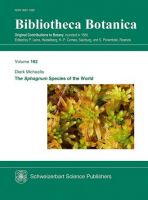
New book by GMC’s peat moss expert
05/12/2019 The comprehensive volume Sphagnum Species of the World by Sphagnum expert Dr. Dierk Michaelis has just been released in English. Peat mosses are of key ecological and economic importance among the mosses and populate almost all continents. In the book 292 Sphagnum species are described in detail and presents keys for their identification, supplemented by data on habitats, geographical distribution and lists of synonyms. 435 pages strong, the volume issued by Schweizerbart Science Publishers represents the updated, supplemented English language version of the author's original peat moss flora of 2011 (in German), the first overall presentation of Sphagnum since Carl Warnstorf's "Sphagnologia Universalis" of 1911. Thus, the Greifswald Mire Centre proudly congratulates its member and author Dierk Michaelis!
Reform = opportunity
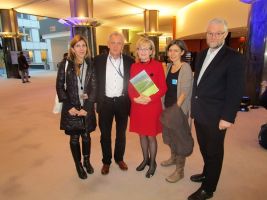
Talks on peatland farming in the EU Parliament
04/12/2019 The Common Agricultural Policy (CAP) is decisive for the agricultural use of peatlands in Europe. Although peatlands account for only 4% of agricultural land in the EU average, emissions from agricultural peatlands contribute 25% of total greenhouse gas emissions from agriculture. With the current reform of agricultural policy, there is a great opportunity to initiate a change in peatland management in Europe, to promote the management of rewetted peatlands and to phase out support on drained peatlands (see also recent GMC policy brief). Dr. Franziska Tanneberger (GMC), together with colleagues from Wetlands International European Association and Interreg Care-Peat project, spoke about peatland distribution and climate relevance in Europe to 13 members of the European Parliament, among them Vice President Mairead McGuinness (Ireland) and agricultural policy expert Peter Jahr (Germany).
Sit-in in the fisherman’s fountain
Greifswald Mire Centre at global climate strike
29/11/2019 Despite chilly temperatures and drab weather the GMC members came for a sit-in in the Greifswald fisherman’s fountain during the global climate strike at 29th November. While they had demonstrated in the same fountain in September - but standing - they now wanted to show: The climate crisis is getting more dramatic than anticipated and sea levels are rising. Worldwide three times more people will be affected by coastal flooding than hitherto predicted. We will not only get wet feet, but climate change will severely affect us if we do not take action. Global climate goals cannot be achieved without rewetting of peatlands worldwide. It is one of the most time- and cost-effective measures for climate protection but still rarely considered. In Mecklenburg-Vorpommern 30 % of the federal state’s greenhouse gas emissions are caused by peatland drainage – an amount that could largely be mitigated by rewetting.
In search of Nile Basin peat
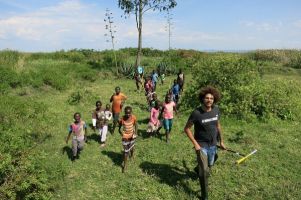
Mission to Nile Basin wetlands completed
09/11/2019 As part of the project „Biodiversity Conservation and Sustainable Utilisation of Ecosystem Services of Wetlands of Transboundary Relevance in the Nile Basin“ jointly implemented by GMC with Wetlands International and Nile Basin Initiative, an assessment of CO2 emissions avoidance potential of the Nile Basin wetlands is being prepared. A field trip to Ghana (in particular to Keta Lagoon wetlands) and Kenya took plave in late October/early November. The search for peatlands was based at peatland (probability) maps of GMC’s Global Peatland Database. At the end of rainy season, several shallow and partly also deeper (2 m and more) peatlands could be mapped.
Climate protection and agriculture
KTBL visits GMC and paludiculture pilot farms in Vorpommern
24/12/2019 The Kuratorium für Bau und Technik in der Landwirtschaft (KTBL) is an association of agriculture, science, commercial industry, administration and consultancy with the task of technology transfer; it is supported by the Federal Ministry of Food and Agriculture (BMEL). Prof. Dr. Christine Tamásy (University of Greifswald) mediated a visit of the GMC by the executive committee and the general management to get information about research and implementation projects. The view into the soil of an agriculturally used, wet grassland area at Lake Kummerow gives a special impression: Thanks to paludiculture, the carbon in the peat remains protected and the area is nevertheless productively used for biomass for local heating. The successful cooperation between Greifswald University and agricultural enterprises in establishing a cattail paludiculture on rewetted peatland was also praised, and the KTBL would like to make greater use of the expertise of the GMC in future.
PRIMA: Milestone reached
Typha and reed now grow on 8 ha
26/09/2019 After several months of preparation, young Typha seedlings were planted mechanically and reed seedlings were planted manually on the 8 hectare pilot site at Neukalen (MV), which was then rewetted. Within the next 2.5 years, the field trial will generate practical information on the technical implementation, plant growth, biomass quality and economic efficiency of Typha and reed paludicultures. With good growth, the first harvest is planned for next year. Additionally, mesocosm experiments, genetic investigations and knowledge transfer are carried out in the Paludi-PRIMA project. The project of University of Greifswald and Research Centre for Agriculture and Fisheries Mecklenburg-Vorpommern is funded by the Federal Ministry of Food and Agriculture (BMEL).
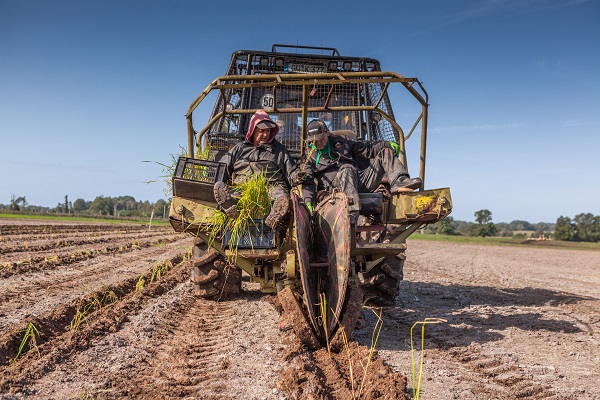
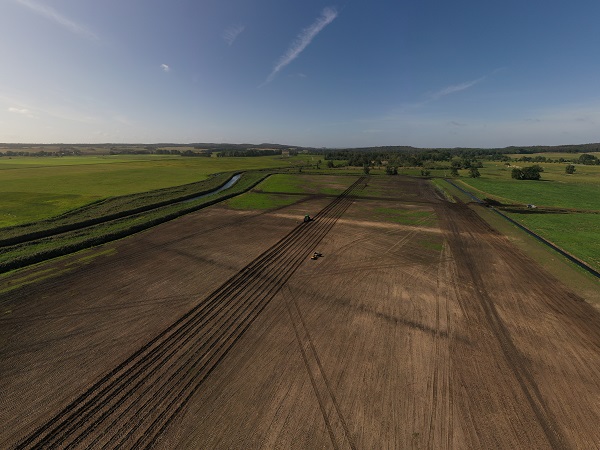
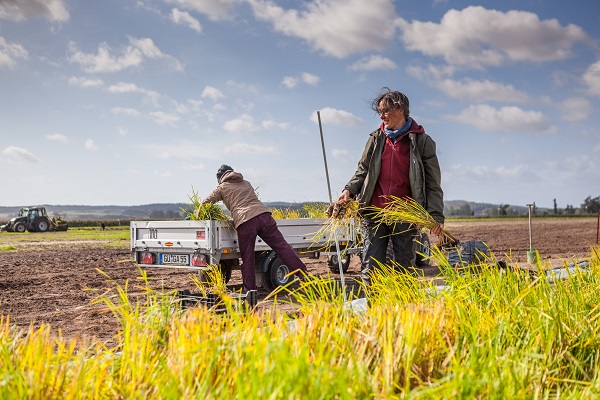
Installing the pilot site for cultivation of reed and typha wihtin the PRIMA project (Photos: T. Dahms)
Fact paper on Germany’s climate programme 2030
Peatland protection as nature-based solution
23/09/2019 The document "Key points for the climate protection programme 2030" published by the Federal Government on 20.09.2019 names sector-specific measures. For the agriculture and forestry sector, no concrete implementation steps have been laid down under "Protection of peat soils / Reduction of peat use in growing media (36)". The GMC fact paper "Peat soil protection as a nature-based solution in the climate protection programme 2030 - rapid cessation of peatland drainage necessary for effective climate protection" compiles the initial situation, potentials and concrete proposals on four pages.
Peatlands must be wet - immediately
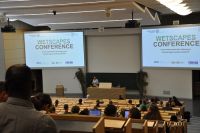
160 scientists agree at WETSCAPES conference
13/09/2019 Peatlands must be wet - immediately. A quick stop to peatland drainage is necessary to achieve global climate protection goals. This is a summary of the results of the international conference held 10.-13.09.2019 at the University of Rostock. 160 scientists from 20 countries discussed the results of their research in drained, rewetted and near-natural peatlands at the WETSCAPES conference. Representatives from various disciplines talked about plant growth, greenhouse gas emissions, nutrient losses and microbial processes in the soil. Most of these scientists deal with individual phenomena, and together they were able to establish clear relationships and connections between the results. This is particularly important for rewetted peatlands, as these systems represent completely novel ecosystems. The four-year joint research project WETSCAPES (derived from "wet" and "landscapes") is funded by the Excellence Research Programme of the State of Mecklenburg-Vorpommern with 5 million euros at the Universities of Greifswald, Partner in the Greifswald Moor Centrum, and Rostock. The abstract volume of the conference is available here.
High demand on paludiculture expertise
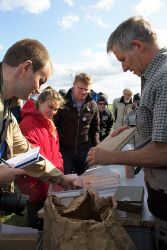
Excursions with international delegations
13/09/2019 During the last two months several delegations from all over the world travelled the north of Germany to be informed about paludiculture projects by the Greifswald Mire Centre. At the end of August, a Ukrainian delegation researched possible requirements for a sustainable, climate-friendly use of recently drained, state-owned peatlands that are to be privatised. The scientists of the GMC explained possibilities for paludiculture in a seminar and showed the harvest of cattail in Kamp and of wet meadow biomass in Neukalen as well as the "paludi biomass heating plant" in Malchin. In mid-September, a Vietnamese delegation visited these sites and travelled to Western Pomerania as part of the Plant3 project. A delegation of Finnish peatland scientists and students also made a stop at the paludiculture sites in the northeast after visiting the Sphagnum farming site in the peatland Hankhauser Moor near Oldenburg (Lower Saxony). Finland now plans to research and implement paludiculture more intensively.
